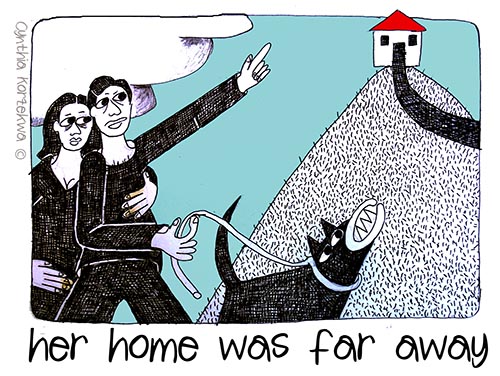Her mother died when she was a little girl. To fill in the void, Dawn kept diaries. Then her father remarried an unpleasant woman who vented her frustrations by destroying everything Dawn had written.

A diary is a confident, a friend who is there to keep one company in the moments of despair and loneliness. To destroy someone’s diary is to scar their soul. Survival instincts pushed Dawn to leave her father’s home and move in with a loving aunt. But the damage had been done. Eternally displaced within, Dawn would later write about her childhood in fictional form with the title “My Home Is Far Away”.

In her early 20s, Dawn left her native Ohio to move to New York City where she married Joseph Gousha, ex-poet and copywriter. The couple lived together in Greenwich Village where, wrote Dawn, “all night long typewriters click, people sing in the streets, hurdy gurdies go all day and the laundry boy reads Turgenev.”

Dawn was socially active and went to numerous cocktail parties were she hung out with the likes of Edmund Wilson, John Dos Passos, Dorothy Parker, and Nabokov. She was also friends with Ernest Hemingway. But, nevertheless, she felt alone. That’s why, Dawn said, she kept a diary—simply because she had no one to talk to.
Loneliness hurts.
Dawn wrote and published much fiction but never became truly successful as a writer. Maybe, in part, because of her struggles related to her handicapped son, her problems with alcohol, and, towards the end, the despair of a tumor. So Dawn was ignored by the literary world until Gore Vidal noticed her. Vidal wrote an article for the New York Review of Books stating that Dawn was overly underrated. Music critic Tim Page read the article and was mesmerized. Page, who suffers from Asperger’s Syndrome, became obsessed with Dawn. Having read that she’d kept diaries, he tried to track them down and eventually learned that they were in the hands of a cousin in Ohio. After much effort and money, Page liberated the forgotten diaries then carefully edited them for publication. He even tried to sell the original diaries but had no offers.
Dawn died in 1965 at the age of 69. All of her work was out-of-print. And her diaries, once full of prose, had assumed an agenda like attitude.
Here are a few diary excerpts:

June 23, 1921 I want so much for my lover. At night when our beds are drawn close together I waken and see his dear yellow head on the pillow — sometimes his arm thrown over on my bed — and I kiss his hand, very softly so that it will not waken him.

March 23, 1944 “For a writer or artist there is nothing to equal the elation of escaping into solitude. The excited feeling of stolen rapture I feel on closing the door of this little room up here, knowing no one can find me, no one will speak to me.”

October 8, 1954 “Writing a novel is like building a bird’s nest – and the bird is a magpie.”
Diaries are friends. But some friends are better than others.

Related: The Diaries of Dawn Powell + Vidal, Gore. “Dawn Powell, the American Writer”. The New York Review of Books. 5/11/1987 + in 2015, 50 years after her death, Dawn was included in the New York State Writers Hall of Fame





